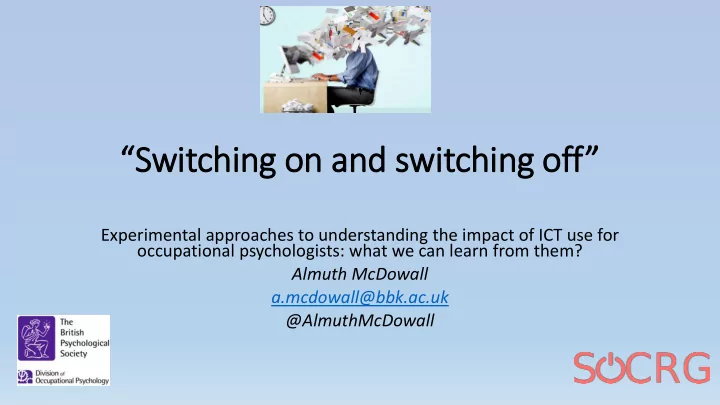

“Switching on and switching off” Experimental approaches to understanding the impact of ICT use for occupational psychologists: what we can learn from them? Almuth McDowall a.mcdowall@bbk.ac.uk @AlmuthMcDowall
Objectives of f this is paper Critically appraise existing experimental evidence Cross sectional data can only tell us so much What impact does technology use have on individuals? Impact on health and well being? Other outcome measures? What are the gaps in our understanding?
Who of you reflects on the why, the how, the where we use technology? Any self experiments?
Lit iterature search 1. Psychinfo: peer reviewed, journals since 1992 (first publications in the area around then), peer reviewed only, adult populations 2. Protocol: Technology Use OR *phone OR email OR tablet OR Video Game AND Health OR anxiety OR depression OR arousal OR well being AND experiment 3. 199 results! Evaluated: relevant to a) technology use and b) to a work context, and c) of sufficient quality? 4. Three experimental studies, three non-experimental studies, plus one (Clayton et al., 2015) which was not elicited through the search
Results of f the evaluation – experimental papers 1. Villani et al: Stress Inoculation Training (SIT): SIT training with phone versus neutral video. Reduced state, trait anxiety and enhanced coping skills in nurses 2. Guimetti et al (2013): experiment where incivility and support where manipulated – communication with supervisor via email. P articipants had higher levels of negative affect and lower levels of energy working with the uncivil supervisor than with the supportive supervisor. Additionally, participants performed significantly worse on math tasks and had lower engagement in the uncivil condition than the supportive condition 3. Marin et al. (2012): experiment where 30 women, 30 men exposed to 24 neutral or negative news events. Results show that women more affected – increased stress reactivity and memory for bad news 4. Clayton et al. (2015): the performance of iphone users on cognitive tasks deteriorated when separated from phones; blood pressure, anxiety and heart rate all increased particularly for prolific users
Results of f the evaluation – non-experimental papers but still in interesting 1. Ohly et al. (2014): surveyed 1714 working individuals, work related smartphone use in evening positively related to detachment, but negatively to positive affect (but unrelated to recovery and to negative affect); autonomous motivation positively related to recocery, detachment and positive affect. 2. Weller et al (2013): surveyed 1006 young participants about phone use and driving behaviour. Attachment towards phone predicted number of trips in which participants used phone whilst driving, and use of social media whilst driving! 3. Hertel et al. (2008): questionnaire study, compared face to face conversation to email use; extraversion and neuroticism as significant predictors, mediated by social skills and social anxiety
Implications: • Technology use affects us physical and mentally – Fact! • It matters WHY and HOW, and with WHOM we are using technology, and the type of communication • The content of the information we are presented with matters – gender differences. What other differences are there? • We need to better understand our complex relationship with technology – how attached are we? Is this a ‘new’ relationship, or displacing something else? The strength of attachment? • Technology can be an enabler, and rather paradoxically potentially help us manage technology-facilitated stresses better! But further research is needed
Quick questions? • A.mcdowall@bbk.ac.uk • @almuthmcdowall
E-Resilience Conference: 21 st April 2016 A trans-disciplinary approach to building e- resilience: managing technology across the lifespan Join the Switched On Culture Research Group (SORCG), for a vibrant day exploring this important area of research. You will hear from high profile researchers, practitioners and industry experts about the emerging concept of e-resilience and its application and wide-ranging implications for well-being and performance. Tuesday 21st April 2016, 10am - 4pm Birkbeck University, London To find out more click on the attached link: http://www.coventry.ac.uk/eresilienceconference2016
References • Clayton, R.B, Leshner, G., & Almond, A. (2015). The Extended iSelf: The Impact of iPhone Separation on Cognition, Emotion, and Physiology. Journal of Computer-Mediated Communication, 2015; DOI: 10.1111/jcc4.12109 • Giumetti, G. W., Hatfield, A. L., Scisco, J. L., Schroeder, A. N., Muth, E. R., & Kowalski, R. M. (2013). What a rude e-mail! Examining the differential effects of incivility versus support on mood, energy, engagement, and performance in an online context. Journal Of Occupational Health Psychology , 18 (3), 297-309. doi:10.1037/a0032851 • Hertel, G., Schroer, J., Batinic, B., & Naumann, S. (2008). Do shy people prefer to send e-mail?: Personality effects on communication media preferences in threatening and nonthreatening situations. Social Psychology , 39 (4), 231-243. doi:10.1027/1864-9335.39.4.231 • Marin, M., Morin-Major, J., Schramek, T. E., Beaupré, A., Perna, A., Juster, R., & Lupien, S. J. (2012). There is no news like bad news: Women are more remembering and stress reactive after reading real negative news than men. Plos ONE , 7 (10), doi:10.1371/journal.pone.0047189 • Ohly, S., & Latour, A. (2014). Work-related smartphone use and well-being in the evening: The role of autonomous and controlled motivation. Journal Of Personnel Psychology , 13 (4), 174-183. doi:10.1027/1866-5888/a000114 • Villani, D., Grassi, A., Cognetta, C., Toniolo, D., Cipresso, P., & Riva, G. (2013). Self-help stress management training through mobile phones: An experience with oncology nurses. Psychological Services , 10 (3), 315-322. doi:10.1037/a0026459
Recommend
More recommend